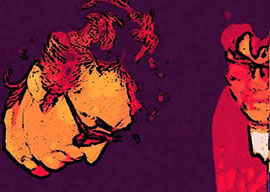
December 07, 2010

Their brush with one another was the paradigmatic encounter between the Celebrity and the Nobody, the “have” and the “have-not” of the postmodern age, an era which hypocritically blasts endless PSAs about “equality,” “democracy,” and “self-esteem” while deriding non-celebrities as losers, wastes of space, and living beings unworthy of life.
The meeting outside of Manhattan’s Dakota building between John Winston Ono Lennon and Mark David Chapman would result in the former’s murder and the latter’s lifelong incarceration. It would provoke numerous public expressions of grief from hundreds of thousands of people who felt their own lives were somehow affected by the death of a man they’d never met.
Mark Chapman, a tormented young man fueled by delusional narcissism, had become obsessed with The Catcher in the Rye, J. D. Salinger’s classic chronicle of adolescent alienation. The novel’s narrator is Holden Caulfield, a bitterly misanthropic teenage boy on the brink of nervous collapse. Holden heatedly fulminates against the world’s “phonies,” people who pretend to be what they aren’t, who pose as righteous when they’re actually venal and selfish.
Chapman soon grew equally fixated on ex-Beatle John Lennon, his former hero, whom he now regarded as the ultimate phony. “He told us to imagine no possessions,” Chapman later put it, “and there he was, with millions of dollars and yachts and farms and country estates, laughing at people like me who had believed the lies and bought the records and built a big part of their lives around his music.”
Chapman came to view it as his mission to uphold Holden Caulfield’s spirit by slaying this vain and gluttonous rock-star monster. He bought a .38-caliber revolver and a plane ticket to New York. He purchased the recently released Double Fantasy album, planted himself in front of Lennon’s luxury apartment building with record in hand and gun in pocket, and waited for the star to ride up in his limo.
For all of his mounting madness, Chapman understood one thing well: You were nobody in the modern world if you weren’t famous. He later told Barbara Walters that by committing the murder, he felt he”d “acquire his (Lennon’s) fame.”
And he was right. Murdering a famous man gave Chapman the very fame he sought. He was no longer a nobody; he was a star.